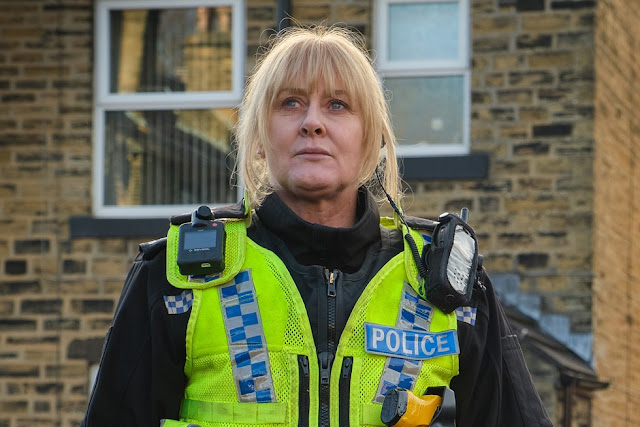A Contemplation on Happy Valley - by Elizabeth Kay
When I started my MA, many years ago, I was asked who I would like to be able to write like. I didn’t want to be able to write like anyone else, I wanted to write like me. There wasn’t anyone else who sounded the way I wanted to sound (I was writing for radio at the time). Until now.
On the whole I don’t like violence on screen, and although there is a fair amount of it none of it is gratuitous, and a lot happens off screen. That I can take. Main villain Tommy Lee Royce’s creepy whisper of “Are you a virgin?” to the kidnapped Ann Gallagher tells us more about what happens later than if we actually witnessed it. Catherine Cawood’s daughter Becky was raped by Royce, became pregnant, and committed suicide after giving birth to Ryan, so there’s a precedent for assuming a brutal and degrading assault… Sally Wainright lets our own imaginations do the work. No plotline or snatch of dialogue is ever wasted. There have been some criticisms that there are a few loose ends that didn’t get tied up. However, I think they all have been. We don’t need to have everything spelled out. We are frequently given just enough information to predict exactly what will happen. If you didn’t pick up the end of a thread, watch it again. You may have blinked.
I attended a number of one-to-one tutorials for BBC TV in the seventies, and much to my surprise I wasn’t asked to pay attention to the latest and most innovative dramas but Shakespeare and Ibsen and R.C.Sherriff. The point was that every good drama has a theme, and it can usually be summed up in one or two words. Hamlet is about indecision. Romeo and Juliet is about prejudice. Macbeth is about ambition.
I think that Happy Valley is about nature versus nurture, and what happens when both are as bad as can be? Tommy Lee Royce, that’s what. Royce never knew who his father was, but we can guess what sort of person he was as Royce’s mother was a heroin addict and a prostitute. Ryan, Royce’s son, has been brought up by Catherine with the dubious help of her daffy sister, Clare, as neither her husband nor her son could bear the sight of Ryan after what happened to his mother. The fear throughout is that tearaway Ryan will turn out like his psychopathic father.
Alison is another good character. Her adult son Daryl is the result of incest – Alison was abused by her father. When Catherine asks whether Daryl knows, Alison says, “I think he worked it out.” Daryl commits some horrific murders, and finally confesses to his mother who shoots him dead from behind so that he doesn’t know, and won’t have to go to prison. It’s an act of love and desperation. And of course there’s none of that 'how did she get hold of the weapon' because she’s a farmer. It’s debatable who is the more psychopathic – Royce, or Daryl.
The humour
often depends on the deadpan delivery of the by now middle-aged Catherine
Cawood. When her ex-husband asks who is fixing Catherine’s Land Rover she tells
him it’s Alison, who’s just come out of prison. “What for?” “Murder.” “Who did
she kill?” “Her son.” We, of course, know that it was a thoroughly justified
killing and that Catherine arrested her for it in the most sensitive of ways
but the ex-husband doesn’t.
Talking to her sister Clare after a violent clash which has left her visibly injured: “We’ve had another bit of a tussle again.” Long pause. “I won…Obviously.
To nine-year-old Ryan, after bad behaviour at
school: “Did you rip up the painting?” “I might of.” “You couldn’t of
done anything, of isn’t a verb.”
And to
sixteen-year-old Ryan, two series later: “He shouldn’ta gone off. Shouldn’t of
left me with Ros.” “Shouldn’t have, for fuck’s sake.”
Wadsworth is a cop turned bad by circumstances. After Catherine gets one of her less impressive constables to give chase to Wadsworth and they catch up, she leaps out of the car, which rolls backwards, and without even turning round she shouts “Handbrake!” We expect the driver to be a prat, and we expect Catherine to know this without even turning to look, and we expect her to always do the right thing whatever the situation, using her resigned-to everyone-else-being-useless voice. When she finally catches up with Wadsworth, the police inspector turned killer, he is standing on the parapet of a bridge. Catherine asks him not to jump, and says she hasn’t had the right talking-someone-down training. Wadsworth says he has. She asks him what she ought to say, and he gives her line-by-line instructions, which she follows. And whilst we’re laughing at the situation, he jumps anyway.
When a collection is made for Catherine’s retirement her immediate boss is astonished at the amount collected. “Oh, she’s very popular,” says Joyce, who has been doing the collection. “All sorts of people have contributed. Even people she’s arrested.”
All of these humorous situations are character based. Our expectations of what people say and do are rarely wrong, until the very last episode of the final series. So if you haven’t seen it, watch the lot from series one. Look and learn.

Comments
Thanks, Elizabeth.